Introduction
Home care software is a specialized tool that streamlines and enhances the management of home care services for older adults and individuals with disabilities. There are an estimated 53 million caregivers in the United states including family caregivers and caregivers (sometimes called home health aides) working for home care agencies. This software supports agencies in delivering high-quality care by automating administrative tasks, improving communication, and ensuring compliance with regulations. In this article, we will explore the core features, benefits, types, and future trends of home care software, as well as provide insights into selecting the right software for your agency.
Core Features of Home Care Software
Home care software typically includes a range of features that cater to the unique needs of home care agencies. Some of the core features include:
- Scheduling Efficiently manage caregiver schedules, ensuring optimal coverage and minimizing conflicts.
- Electronic Visit Verification (EVV): Track and verify caregiver visits in real-time to ensure accountability and
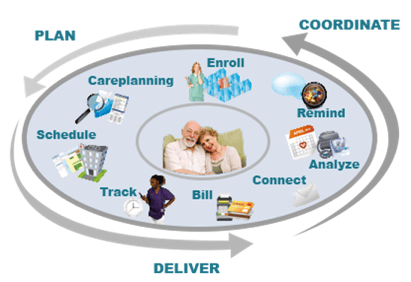 compliance. Agencies who provide services reimbursed by Medicaid need to comply with the EVV law, specified in the 21st Century Cures Act/
compliance. Agencies who provide services reimbursed by Medicaid need to comply with the EVV law, specified in the 21st Century Cures Act/
- Client Management: Maintain detailed records of clients, including tasks that they need assistance with, contacts like family members, preferences and more.
- Billing and Invoicing: Automate billing processes, generate invoices, and manage payments seamlessly.
- Caregiver Management: Track caregiver credentials, training, and performance to ensure high standards of care.
- Communication Tools: Facilitate secure communication between caregivers, clients, and agency staff. Most importantly in this regard is a caregiver app that they can use to clock-in, clock-out, report the tasks that were performed for their client, escalate concerns, view their schedules and communicate with the office.
20 Benefits of Implementing Home Care Software
Implementing home care software offers many benefits for agencies, caregivers, and clients alike. here are some of the top benefits:
- Electronic Billing
- Eliminates paper time sheets
- Documentation is on line (not in a filing cabinet)
- Scheduling is easy and Schedules are visible
- Payroll calculation comes directly from caregiver clock-in / clock-out
- When auditors come, you have electronic proof of your care delivery
- You can access your software from anywhere
- Caregivers can see their schedules on-line

- Client preferences can be shared with caregivers
- Your policies and procedures become automated workflows
- EVV compliance (required by law for homecare reimbursed by Medicaid)
- Family members can get visibility into their loved-ones' care
- Caregiver credentials are kept up to date
- Management dashboards show where to improve and prove that you're improving
- Fraud prevention
- Integration (with accounting, billing, payroll, caregiver recruiting and more)
- Ability to Grow
- When it's time to sell your business, you'll have proof of its value
- Gather the records needed to file taxes
- With great home care software, you can focus on the important things: 1) having great caregivers, and 2) pleasing clients
Types of Home Care Software
The tricky thing about the term "Home Care Software" is that describes software used by "Private Pay" home care agencies, but it is also a blanket term that refers to other types of home care agencies. Here's an overview of the types of home care software:
| Home Care Software Type |
Description |
| Home Care Software |
Home Care Software generally refers to software for private pay home care agencies, but it is also a blanket term that may refer to all types of home care software. |
| EVV Software |
EVV (Electronic Visit Verification) is necessary for agencies who are paid by Medicaid. This may be required in the future when Medicare or Veterans administrations are payers. |
| I/DD Software |
This is specialized software for agencies providing services to consumers with Intellectual or Developmental Disabilities (I/DD). This software might also encompass Day Habilitation (DayHab). |
| Consumer Directed Services Software |
Consumer Directed Services (CDS) home care programs require that the person receiving the care direct, oversee and approve their visits. |
| FMS Software for Self-Direction |
Some programs, especially in disability services, allow the person receiving care to direct how their care is delivered. This is similar to CDS but goes farther, such as allowing the consumer to purchase goods and services that will be reimbursed. |
| Home Healthcare and Hospice Software |
All of the above software types are considered "non-medical" because the care or services are helping the consumer with Activities of Daily Living (ADLs) because of their age or disability. By contrast, home healthcare and hospice software is for medical care after a hospitalization or at the end of a person's life. |
| Other software needed by Home Care and Disability Services agencies |
In addition to the "agency management software" types described above, most home care agencies will also need other software for accounting (such as Quickbooks), Care Provider Education, Caregiver Recruiting, Sales Management, and Payroll (for sending payments and filing taxes). |
Note that this article is focuses on the "type" of home care that enables older and/or disabled people to stay living in their own homes. In this regard it's not primarily a "medical" solution. Instead it's for caregivers who assist with Activities of Daily Living (ADLs).
Selecting the Right Home Care Software for Your Agency
Choosing the right home care software for your agency involves considering several factors:
- Specialized Agency Needs: Determine whether the type of care that you deliver has specialized requirements, like support of Consumer Directed programs, or Medicaid programs which have state specific Electronic Visit Verification (EVV) requirements.
- User-Friendliness: Ensure the software is easy to use for both caregivers and administrative staff.
- Integration: Look for software that integrates seamlessly with the other systems that you'll need. Note that your home care software will manage clients, caregivers, schedules, clock-ins, and billing, but most home care agencies have separate software for accounting (such as QuickBooks), payroll software (for delivering payments and filing payroll taxes, state required interfaces such as EVV, and a public-facing website.
- Support and Training: Consider the level of customer support and training provided by the software vendor.
Challenges in Implementing Home Care Software
While home care software offers many benefits, there are also challenges to consider:
- Cost: Plan for an initial investment for onboarding and training and then a monthly usage fee mostly likely based on how many clients you're serving
- Training: Ensuring that all staff are adequately trained to use the software can be time-consuming.
- Data Security: Protecting sensitive client information requires robust security measures. Even though you might not be providing "medical" care, you should look for HIPAA-compliant software (a measure that protects the privacy of your client's information)
- Resistance to Change: Some staff may be resistant to adopting new technology, requiring careful change management.
Future Trends in Home Care Software
The home care software industry is continually evolving, with several trends shaping its future:
- Artificial Intelligence (AI): AI-powered tools can enhance scheduling, match clients with the best caregiver, and detect fraud, automate mundane tasks, and offer data driven insights.
- Telehealth Integration: Combining home care software with telehealth services to offer remote consultations and monitoring.
- Mobile Accessibility: Increasing use of mobile apps to enable caregivers to access information and communicate on the go.
- Interoperability: Improved integration with other healthcare systems to ensure seamless data exchange and coordination of care.
Case Studies and Success Stories
Many home care agencies have successfully implemented home care software, resulting in significant improvements in efficiency and care quality. For example:
- Matching the cultures of the local community: Agencies in California benefit from caregiver apps that are
 available in English, Spanish, and multipla Asian languages. Other states have different cultural mixes.
available in English, Spanish, and multipla Asian languages. Other states have different cultural mixes.
- Compliance with EVV: Implementing EVV software is a necessity for agencies providing Medicaid Services.
- Management Decision Making: Using data analytics, agency leadership can focus on their specific needs. For one agency, recruiting might me their weakness whereas another agency might be better to focus on execution and billing.
Supplementary Content
In addition to the core features and benefits, home care software can also offer supplementary tools such as:
- Family Portals: Provide family members with access to care plans and updates, enhancing transparency and communication.
- Applicant Tracking and Caregiver Recruiting: Posting job descriptions on popular recruiting sites like Indeed and ZipRecruiter, receiving and reviewing candidates, making offers and more.
- Sales Force Tracking: keeping tabs on your marketing and sales activities
Conclusion
Home care software is a vital tool for modern home care agencies, offering a range of features that enhance efficiency, care quality, and compliance. By carefully selecting the right software and addressing implementation challenges, agencies can leverage these tools to provide better care for older adults and individuals with disabilities. As the industry continues to evolve, staying informed about future trends and success stories will help agencies remain competitive and deliver exceptional care.
Ankota's mission is to enable the Heroes who keep older and disabled people living at home to focus on care because we take care of the tech. If you need software for home care, EVV, I/DD Services, Adult Day Care centers, or Caregiver Recruiting, please Contact Ankota.
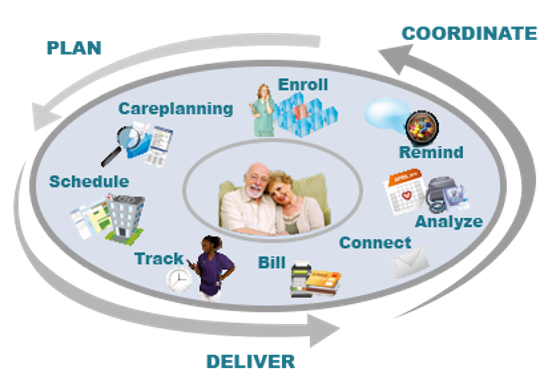
.png)
.png)
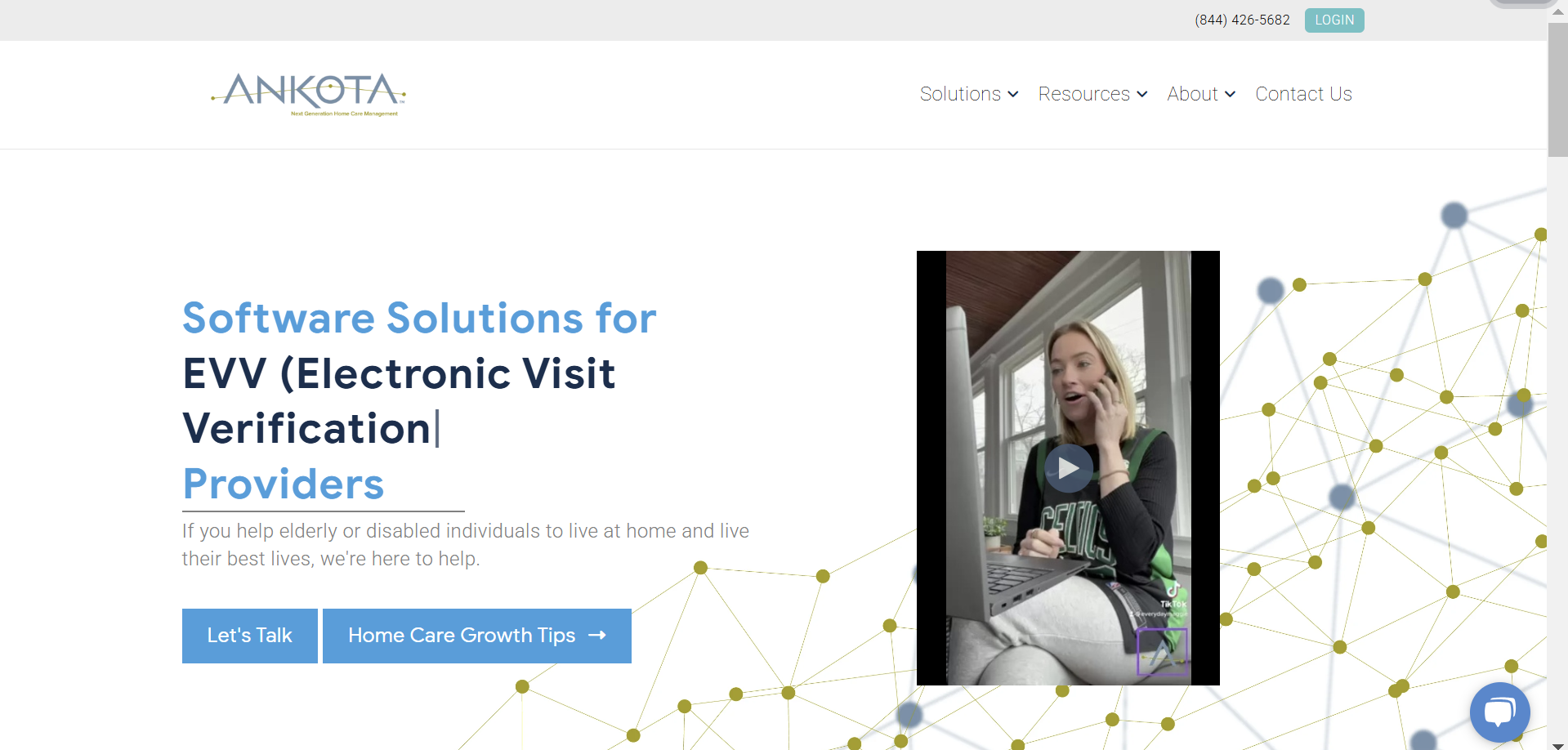
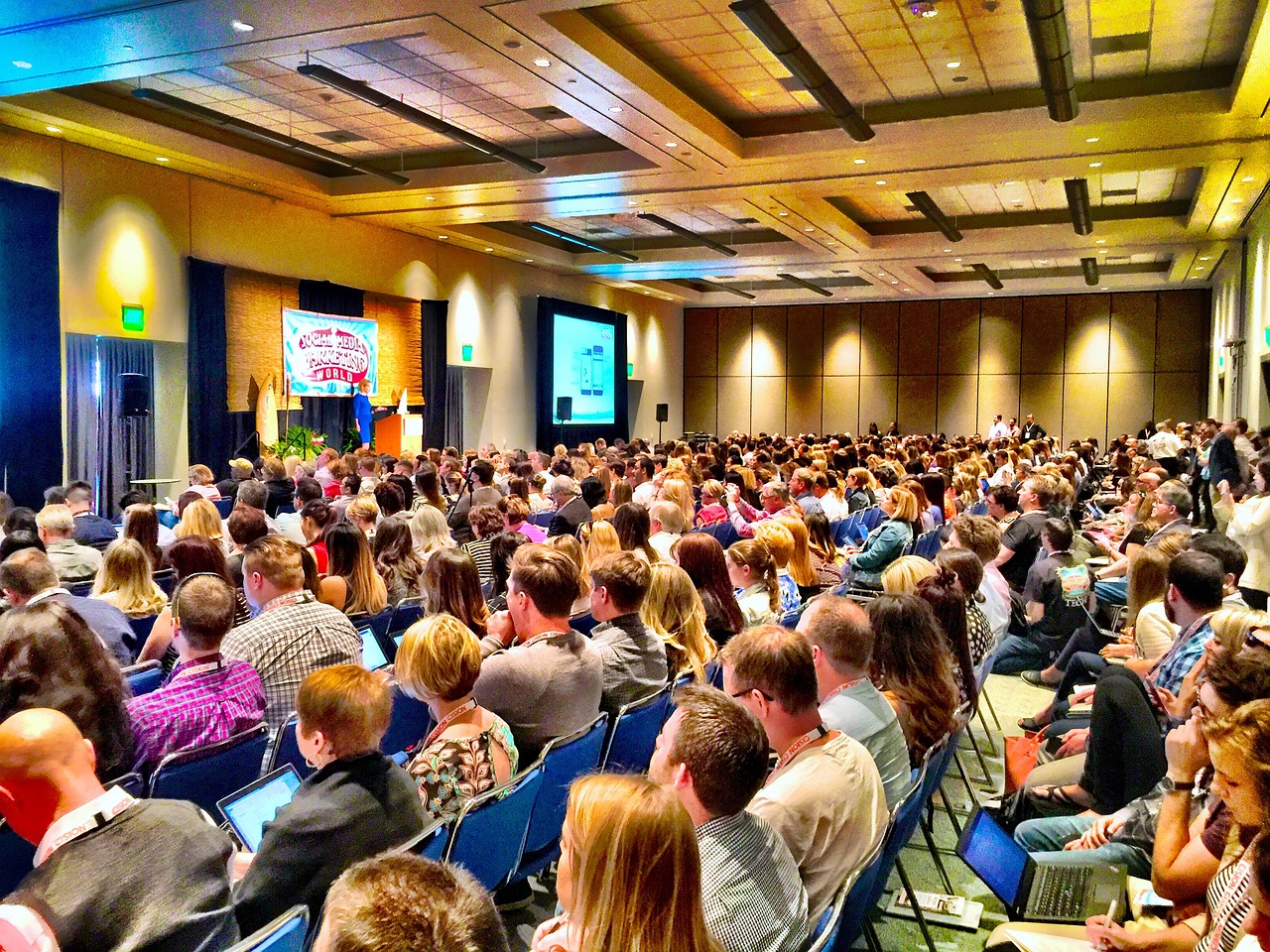
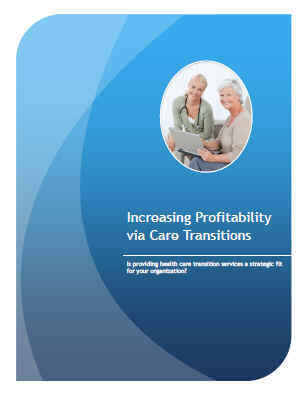

.png)
.png)


